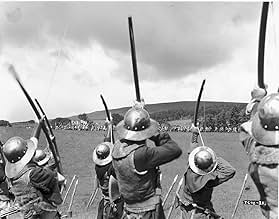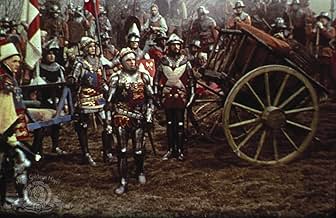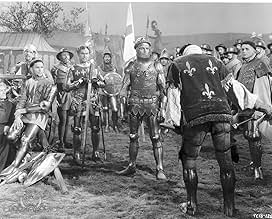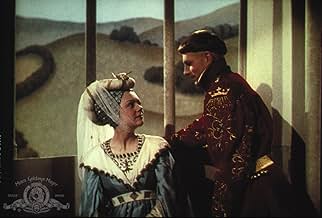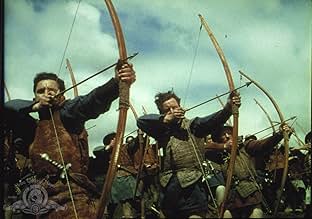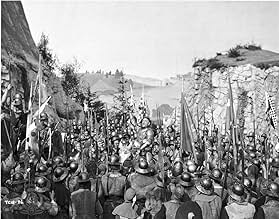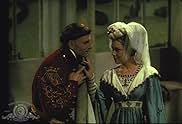Enrico V
Titolo originale: The Chronicle History of King Henry the Fifth with His Battell Fought at Agincourt in France
VALUTAZIONE IMDb
7,0/10
7427
LA TUA VALUTAZIONE
Aggiungi una trama nella tua linguaIn the midst of the Hundred Years' War, the young King Henry V of England embarks on the conquest of France in 1415.In the midst of the Hundred Years' War, the young King Henry V of England embarks on the conquest of France in 1415.In the midst of the Hundred Years' War, the young King Henry V of England embarks on the conquest of France in 1415.
- Regia
- Sceneggiatura
- Star
- Candidato a 4 Oscar
- 12 vittorie e 6 candidature totali
Recensioni in evidenza
What an intelligent film!!! I loved its stage-y quality--The good-humored recreation of a performance in Shakespeare's time with the audience so fully engaged, laughing at jokes we don't understand (e.g., the machinations of churchmen). I loved the details and sense of history--the sets inspired by medieval illuminations and the score by William Walton. The tight script and directing bring out the complexity of the play. Unlike other reviewers, I'd rate it higher than Branagh's more visceral, contemporary version though I can see why some might find this one pallid. It doesn't have a modern feel, and this style of acting Shakespeare feels dated to me--I've grown accustomed to naturalism. Overall, I appreciate that it is many-layered and distinctively English. I hope it accomplished its worthy goal of raising morale during the WWII.
When I saw this movie at age 13 or so, I was terribly disappointed because it was clear that this is the third part in the story. Henry IV Part 1 and Part 2 come before this play, and they tell the story of Sir John Falstaff and his friendship with Prince Hal ( who is Henry V in this play.) The first two plays also introduce Nym, Bardolph, Pistol, and Mistress Quickly. Unfortunately, this play starts after Falstaff has been banished and Prince Hal has become King.
This play is a lot of fun, but it's very frustrating if you haven't read the earlier plays. There are so many poignant (or funny) moments that point backwards. Even the pretend audience at the beginning seems to feel that they want Falstaff back! The best acting moments in this movie are all scenes where the lower characters remember Falstaff and mourn his death.
Of course, there are some heroic battles and speeches in this movie, but looking back after forty years they don't seem as impressive as when I was 13. The great battle is actually over fairly quickly. And a lot of the later scenes drag, like when Captain Fluellen makes Pistol eat his leek. This is played as very bad slapstick when it's actually very violent and brutal in the play.
This play is a lot of fun, but it's very frustrating if you haven't read the earlier plays. There are so many poignant (or funny) moments that point backwards. Even the pretend audience at the beginning seems to feel that they want Falstaff back! The best acting moments in this movie are all scenes where the lower characters remember Falstaff and mourn his death.
Of course, there are some heroic battles and speeches in this movie, but looking back after forty years they don't seem as impressive as when I was 13. The great battle is actually over fairly quickly. And a lot of the later scenes drag, like when Captain Fluellen makes Pistol eat his leek. This is played as very bad slapstick when it's actually very violent and brutal in the play.
This is a brilliantly conceived movie-within-a-play-within-a-movie that showcases the genius of Laurence Olivier. Today's audiences are exposed mainly to Olivier the movie actor. But if you want to see a purer form of acting, see Olivier the stage actor. This is possible by watching his Shakespeare plays on film. And these films are by Olivier the "auteur," long before the term was coined. Olivier's is the legacy to which Branaugh and others, who essay Shakespeare on film, must live up to.
And lest you're expecting a camera pointed at a stage, don't worry. Olivier, who produced and directed most of his Shakespeare films, has actually used the film medium to enlarge his plays' visual scope, while maintaining the intimacy that is the essence of live theatre. Also, Olivier is mindful of how daunting the language of Shakespeare is for modern audiences and has modified much of the original script to be more comprehensible, while preserving the feel of Elizabethan English.
Olivier's "Henry V" was to England what Eisentein's "Ivan the Terrible" was to Russia a familiar history rendered as a national epic, for morale purposes, while audiences were fighting off the Germans during World War II. There are other parallels. For example, both use static, formalized composition, in Henry V's case meant to resemble the images in medieval illuminated manuscripts and books of Hours. (In Ivan's case, according to Pauline Kael, like Japanese Kabuki.) Thus, a sound stage "exterior" backdrop becomes a tableau that serves to enhance, with its flat perspective and subjective scale, the view we have of that fabulous Age of Chivalry for which the play's Battle of Agincourt was the closing act.
I've always scoffed at the extravagant accolades which show business gives its own. But after seeing this film, or his equally brilliant "Hamlet," I can understand why Laurence Olivier was so good, that a knighthood wasn't enough, and so he was raised to the peerage.
And lest you're expecting a camera pointed at a stage, don't worry. Olivier, who produced and directed most of his Shakespeare films, has actually used the film medium to enlarge his plays' visual scope, while maintaining the intimacy that is the essence of live theatre. Also, Olivier is mindful of how daunting the language of Shakespeare is for modern audiences and has modified much of the original script to be more comprehensible, while preserving the feel of Elizabethan English.
Olivier's "Henry V" was to England what Eisentein's "Ivan the Terrible" was to Russia a familiar history rendered as a national epic, for morale purposes, while audiences were fighting off the Germans during World War II. There are other parallels. For example, both use static, formalized composition, in Henry V's case meant to resemble the images in medieval illuminated manuscripts and books of Hours. (In Ivan's case, according to Pauline Kael, like Japanese Kabuki.) Thus, a sound stage "exterior" backdrop becomes a tableau that serves to enhance, with its flat perspective and subjective scale, the view we have of that fabulous Age of Chivalry for which the play's Battle of Agincourt was the closing act.
I've always scoffed at the extravagant accolades which show business gives its own. But after seeing this film, or his equally brilliant "Hamlet," I can understand why Laurence Olivier was so good, that a knighthood wasn't enough, and so he was raised to the peerage.
It's a splendid rendering based on Shakespeare play with a nice staging , dealing with the warrior king Henry V and his grand victory at the battle of Agincourt on St. Crispin's Day, October 15, 1415 . The movie begins with an ingenious initiation , the camera from a first general shot on the background lead us until a foreground where some actors are playing at the Glove theater in 1600 , then several dramatic scenes take place and eventually going back to the Globe for the final scenes . The film is alrightly based on historic events well made by filmmaker and star Sir Laurence Olivier. They are the following ones : Henry V vanquishes Charles VI in Agincourt (1415) and took over Normandy . Charles VI of France signs Troyes treatise in what Henry V is wedded to Charles's daughter . His descendant Heny VI of England will proclaim himself King of France but Charles VII (anterior Delphin) will be crowned king of France in Reims and the ¨100 years war¨ going on until 1453 (date of downfall Byzance).Grand staging of the Shakespearean play of King Henry V .
This is the first of three principal movies directed by Laurence Olivier along with ¨Hamlet¨ and ¨Richard III¨ based on Shakespeare plays . It's an astounding , stirring , stunning and thoughtful film with glimmer , glittering , colorful cinematography and splendid costume . Partly intended as a wartime morale-booster for the British . Certain parts of the play were consequently omitted , such as Henry's hanging of a friend as an example of firm justice . Laurence Olivier won a honorary and special Oscar for his producing , directing and acting in bringing English history part to vivid life of the screen made with pageantry and perfection . The excellent secondary cast is completed with usual players of the English stage theater and films with important careers : Leo Genn (Quo Vadis) , Leslie Banks (Jamaica inn) , Robert Newton (Treasure's island) , Ralph Truman (El Cid) , Felix Aylmer (Ivanhoe) , Ernest Thesiger (Bride of Frankestein) , Neal McGinnis (Jason and the Argonauts) , Freda Jackson (Brides of Dracula). The especial departments are outstanding , thus : Robert Furse in wardrobe and costumes , the classical musician William Walton and the photographer of superproductions Robert Krasker . Rating : Good and notable . Well worth seeing.
This is the first of three principal movies directed by Laurence Olivier along with ¨Hamlet¨ and ¨Richard III¨ based on Shakespeare plays . It's an astounding , stirring , stunning and thoughtful film with glimmer , glittering , colorful cinematography and splendid costume . Partly intended as a wartime morale-booster for the British . Certain parts of the play were consequently omitted , such as Henry's hanging of a friend as an example of firm justice . Laurence Olivier won a honorary and special Oscar for his producing , directing and acting in bringing English history part to vivid life of the screen made with pageantry and perfection . The excellent secondary cast is completed with usual players of the English stage theater and films with important careers : Leo Genn (Quo Vadis) , Leslie Banks (Jamaica inn) , Robert Newton (Treasure's island) , Ralph Truman (El Cid) , Felix Aylmer (Ivanhoe) , Ernest Thesiger (Bride of Frankestein) , Neal McGinnis (Jason and the Argonauts) , Freda Jackson (Brides of Dracula). The especial departments are outstanding , thus : Robert Furse in wardrobe and costumes , the classical musician William Walton and the photographer of superproductions Robert Krasker . Rating : Good and notable . Well worth seeing.
I saw a modern remake of this film, 1989, recently with Kenneth Branagh. The battle showed sweat and blood, a non-theatrical production in comparison to this 1944, very theatrical, Olivier production. Some reviewers denounce the heavy-handed acting of 1944, but I find it charming.
Olivier has an economical charisma. His acting has few flourishes, but his voice says everything. Olivier in period costume is mesmerizing. As Shakespeare's bad-boy prince turned earnest King, Olivier takes charge and demands the return of English lands from the rather effeminate French nobility. Outnumbered 10 to one, his merry band of Englishmen dispatches the Dolphin at Agincourt. Then he courts the French speaking princess Katherine with broken French and economy.
The recreation of old London and the Globe Theatre was delightful. The audience and players went on in heavy rains without complaint. The mention of Falstaff's name is enough to get applause, though the buffoon has only a short death scene.
I do believe the play has been abridged. Many of the longer speeches seem shortened. Still, this is accessible Shakespeare. How can you go wrong? Never!
Olivier has an economical charisma. His acting has few flourishes, but his voice says everything. Olivier in period costume is mesmerizing. As Shakespeare's bad-boy prince turned earnest King, Olivier takes charge and demands the return of English lands from the rather effeminate French nobility. Outnumbered 10 to one, his merry band of Englishmen dispatches the Dolphin at Agincourt. Then he courts the French speaking princess Katherine with broken French and economy.
The recreation of old London and the Globe Theatre was delightful. The audience and players went on in heavy rains without complaint. The mention of Falstaff's name is enough to get applause, though the buffoon has only a short death scene.
I do believe the play has been abridged. Many of the longer speeches seem shortened. Still, this is accessible Shakespeare. How can you go wrong? Never!
Lo sapevi?
- QuizThe opening model shot of London was huge, 50 feet by 70 feet in size, and made of plaster. It took four months to construct.
- BlooperHenry V's reign was in the early 1400s, but most of the costuming in the film is from 1600, the time of the plays writing, almost 200 years later. The armor on the other hand is accurate. In fact, there is no anachronism in the costumes. The story is told from two points of view (one in the 1600s, as a performance in the Globe Theater; the other in the 1400s, as the characters originally lived). Costumes shift on purpose according to the point of view.
- Citazioni
King Henry V of England: Tell the Dauphin his jest will savor but of shallow wit, when thousands weep more than did laugh at it.
- Curiosità sui creditiThe main title not only gives the full title of the play as William Shakespeare wrote it, but spells the words in the 16th-century manner, not in modern spelling.
- Versioni alternativeIn the American release of the film, all references to "bastards" in the dialogue were excised.
- ConnessioniEdited into Il padrone del mondo (1961)
- Colonne sonoreAgincourt Hymn (Deo gracias Anglia)
(uncredited)
Latin hymn text set to anonymous tune (1415)
Arranged by William Walton
I più visti
Accedi per valutare e creare un elenco di titoli salvati per ottenere consigli personalizzati
- How long is Henry V?Powered by Alexa
Dettagli
Botteghino
- Budget
- 475.000 £ (previsto)
- Lordo in tutto il mondo
- 62.619 USD
- Tempo di esecuzione2 ore 17 minuti
- Mix di suoni
- Proporzioni
- 1.37 : 1
Contribuisci a questa pagina
Suggerisci una modifica o aggiungi i contenuti mancanti




